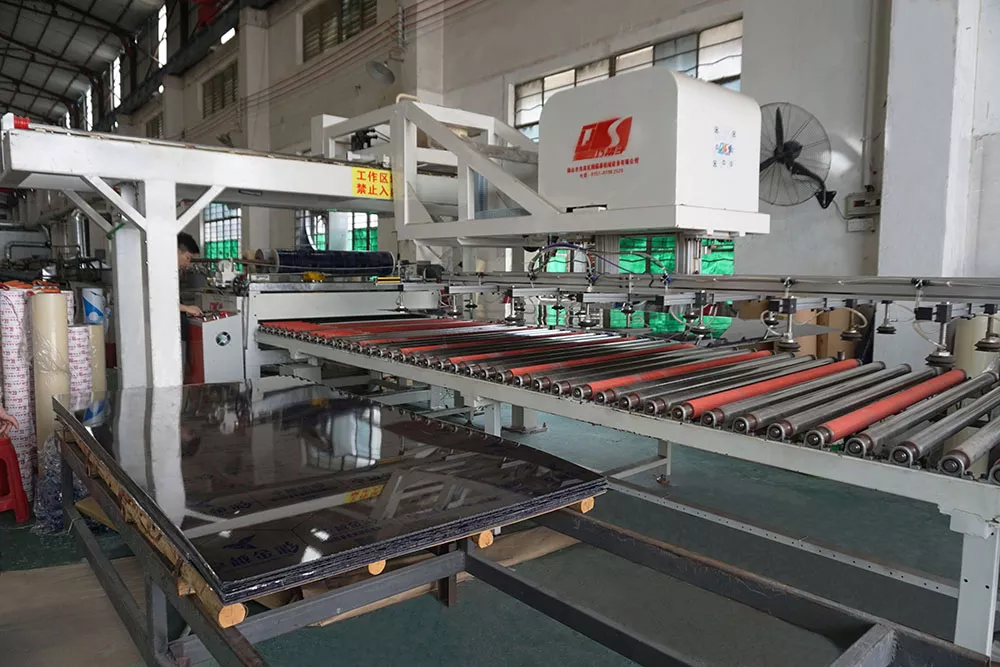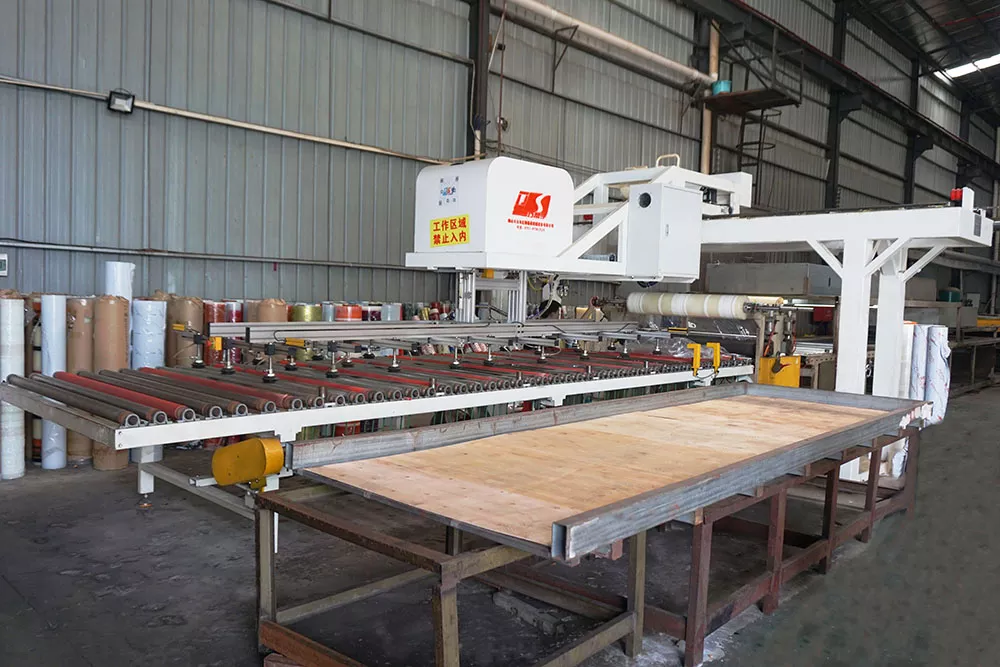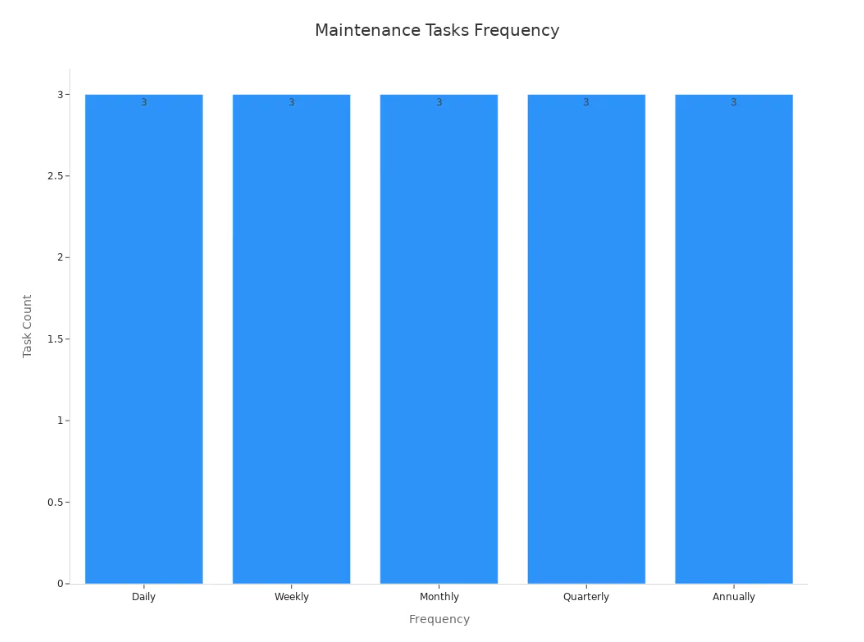How Vacuum Suction Automatic Panel Handlers Improve Workplace Safety?
Heavy panels can be dangerous to move by hand. Workers may get hurt from muscle strain, back pain, or dropping panels. A Vacuum Suction Automatic Panel Handler solves this problem. It uses strong suction to hold panels safely. This tool makes lifting easier and moving panels more accurate. It helps keep the workplace safer and work faster. With its smart suction system, injuries go down, and work gets done better in factories.
Tip: A Vacuum Suction Automatic Panel Handler keeps workers safe and protects delicate materials from damage.
Key Takeaways
· 1. Vacuum Suction Automatic Panel Handlers help avoid injuries by stopping heavy lifting, making workplaces safer.
· 2. Checking them daily and inspecting monthly keeps them working well and avoids accidents.
· 3. Safety features like vacuum checks and stop buttons keep panels safe and protect workers.
· 4. These handlers can lift many materials like glass, metal, and wood, so they are useful in many industries.
· 5. Using these tools makes factories and warehouses faster and safer for handling fragile items.
How Vacuum Suction Automatic Panel Handlers Work
Key Parts of Vacuum Suction Automatic Panel Handlers
A Vacuum Suction Automatic Panel Handler has many important parts. Suction cups are the main part of the system. These cups stick to the panel by creating a vacuum seal. A vacuum pump pulls air out to make the suction work. The control system lets you change the pressure for different materials. Sensors check the vacuum level to stop panels from falling. The frame or arm holds everything and helps move panels carefully.
A suction gripper can grab many shapes and materials. It uses a vacuum cleaner as a pump, controlled by an Arduino. This shows how vacuum suction works in robots.
How Vacuum Suction Technology Works
Vacuum suction technology is simple but works very well. When turned on, the pump removes air from the suction cups. This creates a low-pressure area that holds the panel tightly. You can change the suction strength for different panel weights or surfaces. After lifting, the arm moves the panel where it needs to go. The system keeps the panel steady, lowering the chance of accidents.
|
Feature |
What It Does |
|
Works All Day |
Can run 24/7 and handle tough materials without overheating. |
|
Safety Features |
Built to meet safety rules, cutting injury risks and costs. |
|
Easy to Use |
Reduces heavy lifting, saves cleanup time, and prevents injuries. |
Panels and Materials It Can Handle
These handlers can lift many types of panels and materials. They work with glass, metal, wood, and even delicate plastic or composite panels. The suction cups adjust to smooth or slightly rough surfaces. This makes them useful in factories, construction sites, and shipping centers.

Automatic Plate Handling Machine
Safety Features of Vacuum Suction Automatic Panel Handlers
Vacuum Monitoring Systems for Stability
Vacuum monitoring systems help keep panels steady while moving. These systems always check the suction pressure in the cups. If the pressure drops, they send an alert right away. This stops accidents caused by losing suction. It ensures panels stay attached, even if they are heavy or fragile.
Research shows these systems work well for stability. For example:
|
Study Title |
Findings |
|
Medium Voltage Vacuum Switchgear Monitoring |
Tests show early problems can be found with vacuum checks, improving stability. |
|
Pressure Monitoring for Vacuum Circuit Breakers |
Explains why checking vacuum pressure is key for safety and performance. |
Using a Vacuum Suction Automatic Panel Handler with these systems lowers risks and makes workplaces safer.
Backup Mechanisms to Prevent Failures
Backup systems are important to avoid problems during use. If the main vacuum pump fails, a second pump starts working right away. This keeps the system running without delays.
Some handlers also have battery-powered backups. These keep suction working briefly during power outages. This gives enough time to safely lower the panel. This feature is helpful in places where power cuts happen often. With these backups, the handler stays reliable in different situations.
Emergency Stop Functions and Safety Alarms
Emergency stop buttons and alarms protect workers and equipment. The stop button lets you quickly turn off the machine in emergencies. This is useful for sudden problems like losing suction or a breakdown.
Safety alarms add extra protection. They warn you about issues like low suction or system overload before they get worse. Many handlers meet strict safety rules to ensure they are safe to use. For example:
|
Safety Feature |
Description |
|
Emergency Stop |
Stops the machine instantly during emergencies. |
|
Control Filter Monitor |
Finds filter problems to keep operations safe. |
|
Relief/Venting System |
Safely vents explosions and stops the machine. |
|
Certifications |
CE, EX – proves it meets safety rules for risky areas. |
These features make Vacuum Suction Automatic Panel Handlers a safe and dependable choice for lifting heavy panels.

Vacuum panel handler
Applications of Vacuum Suction Automatic Panel Handlers
Manufacturing and Assembly Lines
Vacuum Suction Automatic Panel Handlers are very helpful in factories. They safely lift and move heavy or oddly shaped items. These handlers can also handle fragile things like glass without breaking them.
Here are some examples of their benefits:
· 1. Special vacuum systems safely lift heavy and uneven materials.
· 2. The Vacupredator suction cup grips flexible surfaces tightly and securely.
· 3. Tests show they can hold 25 kg bags during fast movements, preventing drops and injuries.
Using these handlers makes workplaces safer and more efficient.
Warehousing and Logistics
In warehouses, these handlers make work faster and safer. They carefully move delicate items and reduce mistakes. You can connect them to machines for automatic loading, which saves time.
|
Benefit |
Description |
|
Damage-free transport |
Protects fragile items from breaking during handling. |
|
Reduced errors and accidents |
Automatic loading lowers mistakes and keeps workers safe. |
|
Increased productivity |
Works with machines to load panels faster and easier. |
These systems improve safety and speed up work in warehouses.
Construction and Heavy Material Handling
Construction sites deal with heavy and dangerous materials. These handlers lift and move them safely, reducing risks. They help avoid accidents like falls or being hit by objects.
Look at these facts:
· 1. In 2011, 721 construction workers died in the U.S., making up 17.5% of private industry deaths.
· 2. The “Fatal Four” causes were falls, electrocution, and being hit by objects.
· 3. Stopping these causes could save 410 lives every year.
Using these handlers can make construction sites much safer.
Maintenance Practices for Safe Operation
Regular Inspection of Vacuum Components
Checking your handler often keeps it safe and working well. Every day, look at hoses for damage, empty the container, and check the filter light. Each week, clean the pre-filter, check seals, and inspect wires. Once a month, clean motor vents, check vacuum pressure, and inspect the main filter. Every three months, replace filters if needed and check motor brushes. Once a year, have a professional check it, replace worn parts, and ensure it meets safety rules.
|
Frequency |
Maintenance Tasks |
|
Daily |
Empty container, Check hoses, Look at filter light |
|
Weekly |
Clean pre-filter, Check seals, Inspect wires |
|
Monthly |
Clean vents, Check vacuum pressure, Inspect main filter |
|
Quarterly |
Replace filters, Check motor brushes, Test safety systems |
|
Annually |
Professional check, Replace worn parts, Verify safety rules |
“Fixing problems early costs less than waiting for breakdowns,” says Liu Feng, a maintenance expert. “One hour of care saves three hours of lost work.”
Cleaning and Replacing Suction Cups
Suction cups are key to holding panels securely. Dirt and wear can make them less effective. Clean them often with a soft cloth and mild soap. Don’t use strong chemicals that could harm the material. Check for cracks or damage and replace them right away if needed. Keeping suction cups clean and in good shape prevents accidents and ensures safe operation.
Calibration and System Testing
Calibration makes sure your handler works accurately. Test vacuum pressure often to match the needs of your materials. Run system tests to check alarms and emergency stop buttons. Every three months, confirm all safety systems are working properly. These steps keep your handler reliable and reduce unexpected problems.
 Tip: Regular testing and calibration not only improve safety but also help your equipment last longer.
Tip: Regular testing and calibration not only improve safety but also help your equipment last longer.
A Vacuum Suction Automatic Panel Handler helps make workplaces safer. It lowers the dangers of lifting heavy items by hand. Its smart safety features, like vacuum checks and backups, ensure it works well. Cleaning suction cups and testing systems often keeps it in good shape. Using this tool improves safety and speeds up work in your industry. It protects workers and makes handling materials easier and more efficient.
FAQ
Which industries use vacuum suction automatic panel handlers the most?
Factories, construction sites, and warehouses use them a lot. These tools make lifting heavy or fragile items safer and faster. They are also helpful in moving goods in logistics.
How do vacuum suction handlers help prevent workplace injuries?
They stop workers from lifting heavy panels by hand. This lowers risks like back pain, muscle injuries, and dropped items. Safety features keep materials secure during use.
Can vacuum suction handlers lift all types of panels?
Yes, they can lift many materials like glass, wood, metal, and plastic. The suction cups adjust to smooth or slightly rough surfaces. This makes them useful for different jobs.
How often should you check a vacuum suction handler?
Check hoses and filters every day. Clean suction cups weekly and test safety systems every three months. Get a professional inspection once a year to keep it safe and reliable.
Are vacuum suction handlers simple to use?
Yes, they are easy to operate. You can change suction strength with the controls. Safety alarms and stop buttons make them safe and simple for workers to use.

